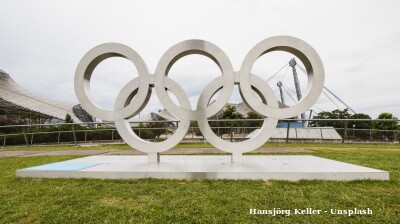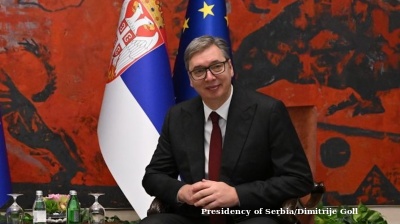President Vladimir Putin put the blame for the war in Ukraine squarely on the West and warned his citizens to prepare for a long war in his first State of the Nation speech for two years.
"The responsibility for fuelling the Ukrainian conflict, for its escalation, for the number of victims... lies completely with Western elites," Putin said to a packed hall just off Red Square. He claimed that these elites were attempting to "inflict a strategic defeat on Russia."
"Step by step, we will carefully and systematically achieve the aims that face us," Putin said on February 21, adding that Russia was at a crucial stage in the struggle which has seen as many as 150,000 Russian servicemen killed in the war the Kremlin thought would only take three days to win.
"I am delivering this address at a difficult time, as we all know, a pivotal time for our country, as the world is going through radical and irreversible changes and crucial historical events are taking place that will define the future of our country and our people," Putin said, hinting that the citizens of Russia prepare themselves for a long war.
With the fighting in Ukraine having ground down to a stalemate, Russia is widely seen to be preparing for a spring offensive that is already under way, according to comments by Nato Secretary General Jens Stoltenberg at the weekend.
Putin may also launch a second mass mobilisation in the coming months to add more men to a draft that saw 300,000 conscripted in September. Ominously, Putin added that all Russian nationals had "great responsibilities."
Russia cannot be defeated on the battlefield, Putin said: "They cannot but realise that it is impossible to defeat Russia on the battlefield… The elites of the West do not hide their aim to make Russia, as they say outright, suffer a strategic defeat. What does this mean? What is it for us? It means that they wish do away with us once and for all. In other words, to send a local conflict into the phase of a global confrontation. This is precisely how we understand it all, and we will react accordingly. In this case the existence of our country is on the agenda," he added.
This speech has come a long way from his first State of the Nation speech in 2000, when he put boosting the population by encouraging Russians to have more babies at the top of his agenda and promising that Russia’s economy would “catch up with Portugal.”
West is to blame
Putin’s address had several important propaganda goals, to prepare the population for tougher times to come if Russia escalates the fighting and sends more of its citizens to the front line. But it also painted a very clear of the growing paranoia that has driven Putin’s foreign policies for more than a decade and a half. During the course of the speech he laid out many of the fears that have driven his conviction that a war with Nato was inevitable, as bne IntelliNews laid out in an op-ed asking: has Putin gone mad?
The main thrust of the address was to blame the West for the war, but he went into considerable detail and sketched out the major historical landmarks that led to the conflict. He argued it is the culmination of a long process of aggression against Russia and the attempt by the US to form a global hegemony. He has long argued that the West has ignored Russia’s legitimate security concerns about the eastern expansion of Nato to Russia’s borders and failed to take these concerns seriously.
"Russia did its best to solve the problem in Ukraine peacefully, but the statements of Western leaders turned out to be fraudulent and untrue," Putin said at the Gostinyy Dvor hall just off Red Square in the heart of Moscow, referring obliquely to former German Chancellor Angela Merkel’s recent admission that the Minsk II peace process was nothing more than a way to buy time for Ukraine to prepare for conflict with Russia.
Referring to the Ukrainian theatre of war as "historical Russian land," he went on to add that “promises of the Western countries to pursue a peaceful settlement of the conflict in Donbas turned out to be a blatant forgery and a lie, as these countries were engaged in chicanery,” Putin said in a clearer reference to Merkel, whom he did not name.
"[The West] has been simply dragging out the time, [was] engaged in deceit and turned a blind eye on politically motivated murders, [the] Kyiv regime’s repressions against unwanted, abuse of [religious] believers,” said Putin pushing several of the Kremlin’s propaganda buttons as this speech was aimed entirely at the domestic audience. The Kremlin has long said that the post-Maidan government was installed in an illegal coup, backed by Washington and supported by far-right neo-Nazis. At the time, former President Petro Poroshenko organised a schism with a new independent Orthodox Church of Ukraine (OCU) breaking off from the confusingly similarly named Ukrainian Orthodox Church (UOC), which is under the control of the Moscow Patriarchy – a move condemned by Moscow as politically motivated and sacrilegious.
"They have stepped up their encouragement of Ukrainian neo-Nazis pushing them for more acts of terrorism in Donbas," he said bring the point home.
Later in the speech Putin went on to complain about what he sees as the US constant interference in the domestic politics of all the countries in the Former Soviet Union (FSU), not just Ukraine, and alluded to US overt backing of various “coloured revolutions” in the region over the years.
"For all the years since the collapse of the Soviet Union, the West never stopped trying to ‘set on fire’ post-Soviet states and, what is most important, to ultimately ‘be done with’ Russia as the biggest remaining part of our historic state space. They have been pardoning international terrorists and setting them on us, provoking regional conflicts along the perimeter of our borders, ignoring our interests and using means of economic restraint and pressure," he told the assembled Russian political and business elite.
The theme of Western interference in Russia’s domestic affairs has been a constant trope throughout Putin’s two decades in office and the basis of many of his more ugly decrees. Several years ago, the Kremlin began labelling NGOs with Western backing as “foreign agents”, mainly targeting those working to promote democracy, but which the Kremlin sees as an attempt to found fifth columns within Russia. More recently these laws have been extended to include the entire opposition media, if they expound on the same democratic themes as the Kremlin abandoned its “repression-lite” policies to adopt straight repression, says political analyst Mark Galeotti.
"It looks like they [in the West] are taking pride in their treachery, calling both the Minsk agreements and the Normandy Quartet a diplomatic show and a bluff,” Putin said, adding: “Donbas was ablaze and blood was being shed and when Russia was sincerely pressing for a peace solution they were playing with people's lives. In fact, they were playing with marked cards.”
Merkel confirmed that Minsk II talks were little more than a ruse to buy time and prevent the fighting in Donbas escalating into a civil war when she was duped into a telephone conversation by two famous Russian pranksters who convinced her she was talking to former President Petro Poroshenko.
The signing of the Minsk agreements gave Ukraine time to develop between 2014 and 2021 and served to ensure that the West be able to furnish the necessary support to Kyiv, Merkel told the Russian pranksters Vladimir Kuznetsov (Vovan) and Alexei Stolyarov (Lexus) on February 20.
Under the impression she was talking to Poroshenko Merkel said that now there was no point in "digging into 2014." "Then (in 2014), in order to prevent even worse things, everyone signed this agreement. Was it possible to stop the war then? This question is no longer relevant. I believe that the Minsk agreements gave Ukraine more time to develop between 2014 and 2021. Now Ukraine can both make a response and also to get the necessary support," she said.
The confession is politically embarrassing for Merkel and the West and has been a propaganda gift to Putin, who has been equally disingenuous. Russia participated in the Minsk II agreement, not as a belligerent but as an observer, despite the fact that the separatists fighting against the government forces were backed by Russia, which has also covertly sent in Russian regulars to co-ordinate and supply the rebels.
Russian diplomacy
Putin went on to complain that the Kremlin has tried to meet the West half way over the Ukraine issue, where Russia was concerned about the increasingly close military co-operation with Nato and growing supply of weapons.
The process started with Russian Foreign Minister Sergei Lavrov’s “new rules of the game” speech in February 2020, where he said the days of “business with one hand, sanctions with the other,” were over and threatened to break off diplomatic relations if the West didn’t stop trying to interfere in Russia’s internal affairs. Russia then did break off diplomatic relations with Nato that October.
Relations steadily worsened, with Russia massing troops on Ukraine’s border twice in 2021 as Russia tried to force a diplomatic dialogue on the status of Ukraine, but to no avail. Then in December the Russian Ministry of Foreign Affairs issued an eight-point list of demands that was topped by a legal guarantee that Ukraine never joins Nato. Two rounds of diplomacy followed, led by the US in January and the French in February, but when both failed Russia crossed the border a year ago this week.
Russia was ready to hold dialogue on security with the West, but received a hypocritical reaction and Nato’s expansion in response, Putin said, who first publicly complained about Nato expansion during his famous speech at the Munich Security Conference in 2007, where he warned the West Russia would eventually “push back” if the expansion continued.
"In December 2021, we officially sent draft treaties on security guarantees to the United States and Nato. But in fact we received open refusal regarding all key, fundamental proposals. Then it finally became clear that the go-ahead to the implementation of aggressive plans had been given and that they are not going to stop," Putin said referring to the Russian Ministry of Foreign Affairs' list of demands. In fact, US Secretary of State Antony Blinken told Lavrov at the time the US was open to negotiating on most of the points on the list, especially restoring the arms control talks, but refused point blank to exclude the possibility of Ukraine’s Nato membership permanently. Lavrov said that without an agreement over Ukraine’s Nato status none of the other points could be discussed.
Putin stressed that the United States had unilaterally severed the fundamental agreements that were "maintaining peace on the globe." In particular, it pulled out of the Intermediate-Range Nuclear Forces Treaty (INF), one of several Cold War-era security agreements that the US unilaterally withdrew from for no apparent gain.
The process started with George W. Bush’s decision to withdraw from the ABM treaty in 2002, another missile agreement, despite loud protestations by the Kremlin, and set the two countries on a collision course.
Ironically, US President Joe Biden, who was a Senator at the time, objected to the decision, arguing that it would undermine international security arrangements that had helped to prevent a nuclear world war in the Soviet-era. Doubly ironically, in his first week in office Biden tried to reverse that policy by renewing the START II missile treaty in January 2021 and indicated that he wanted to put the other treaties back in place, something that was warmly greeted by Russia, which immediately suggested talks on renewing the INS treaty should start.
In a sign of how bad relations have become, Putin announced Russia was suspending the START deal in a clear signal to Washington that Russia will not back down in this clash.
"I have to say today that Russia is suspending its participation in New START. I repeat, not withdrawing from the treaty, no, but merely suspending its participation," the president said.
"We were open and sincerely ready for a constructive dialogue with the West. We said and insisted that both Europe and the entire world need indivisible security system equal for all states. For many years, we have been offering our partners to jointly discuss this idea and work on its implementation," Putin said.
"In response, we received an unclear or hypocritical reaction," the Russian leader stressed. "But there were also specific actions – Nato’s expansion towards our borders and the creation of new missile shield sites in Europe and Asia," the president said referring the defensive missiles that Nato put into Poland and Romania that only became possible after the US withdrew from the ABM treaty.
While many commentors have argued that Putin is perpetrating an imperial war of expansion as he doesn’t see Ukraine as a “real country”, Putin’s speech supports the argument that he is primarily concerned with Russia’s security and afraid of Nato’s intentions. On Ukraine he said specifically that Russia is not fighting a war against the Ukrainian people, but against the government that is a puppet of the West, according to Putin.
"We are not at war with the people of Ukraine. I have already said so many times. The people of Ukraine have become hostages of the Kyiv regime and its Western patrons, who have actually occupied that country politically, militarily and economically," he said.
What were poor relations between Moscow and Washington have escalated into a proxy war being fought in Ukraine, as far as Putin is concerned, and now the fighting has started he says that Russia will not back down. Putin said that further Western arms deliveries to Ukraine would lead to a Russian response.
"The more long-range Western systems are delivered into Ukraine, the further we'll have to push the threat from our borders," he said, going on to allude to the new hypersonic missiles Russia has developed and which Putin showcased in during his 2018 State of the Nation speech with dramatic computer simulations that showed a Russian missile flying half way round the world to hit a target in the US.
"We will actively use the most advanced technologies to boost the army’s qualitative potential. We do have such development, weapons and vehicles in each of the directions. Many of them considerably surpass foreign analogues in terms of their characteristics and now our task is to launch their mass production. Such work is being done," he said in a clear threat to the US.
Putin’s attitude to Ukraine remains controversial, but he repeated claims several times in his speech that Ukraine is Russia’s “historical lands”, diving into his favourite topic of history to justify the claims. Putin reiterated that the project to create an "anti-Russia" that the West is now carrying out in Ukraine is "not new."
"It was nurtured in the Austro-Hungarian Empire, [it was nurtured] by Poland and other countries with one goal: to tear away from our country these historical territories, which today are called Ukraine. This is what this goal is, there is nothing new here, no novelty, everyone repeats things," the president stressed.
News

IOC sanctions Indonesia over Israel visa ban
The International Olympic Committee has announced that international sports federations will be advised not to hold competitions or meetings in Indonesia after the country barred Israeli athletes from entering.

Serbian president accuses EU of backing “colour revolution” after European Parliament adopts harsh new resolution
MEPs back the toughest rebuke yet from Brussels towards Serbia in over a decade of EU candidacy.

Asian carrot smuggling ring busted in the Philippines
The cargo, consigned to Fourth Consumer Goods Trading, contained more than 53,000 kilograms of carrots that were already beginning to rot.

India, US near major trade deal cutting tariffs to 15–16% if New Delhi will limit Russian crude imports
India and the United States are close to finalising a long-awaited bilateral trade deal that could sharply lower tariffs on Indian exports to about 15–16% from the current average of 50%



